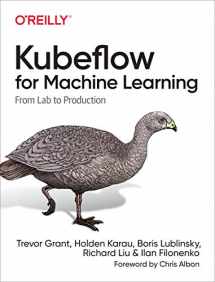
Kubeflow for Machine Learning: From Lab to Production
Book details
Summary
Description
If you're training a machine learning model but aren't sure how to put it into production, this book will get you there. Kubeflow provides a collection of cloud native tools for different stages of a model's lifecycle, from data exploration, feature preparation, and model training to model serving. This guide helps data scientists build production-grade machine learning implementations with Kubeflow and shows data engineers how to make models scalable and reliable.
Using examples throughout the book, authors Holden Karau, Trevor Grant, Ilan Filonenko, Richard Liu, and Boris Lublinsky explain how to use Kubeflow to train and serve your machine learning models on top of Kubernetes in the cloud or in a development environment on-premises.
- Understand Kubeflow's design, core components, and the problems it solves
- Understand the differences between Kubeflow on different cluster types
- Train models using Kubeflow with popular tools including Scikit-learn, TensorFlow, and Apache Spark
- Keep your model up to date with Kubeflow Pipelines
- Understand how to capture model training metadata
- Explore how to extend Kubeflow with additional open source tools
- Use hyperparameter tuning for training
- Learn how to serve your model in production


We would LOVE it if you could help us and other readers by reviewing the book
Book review



